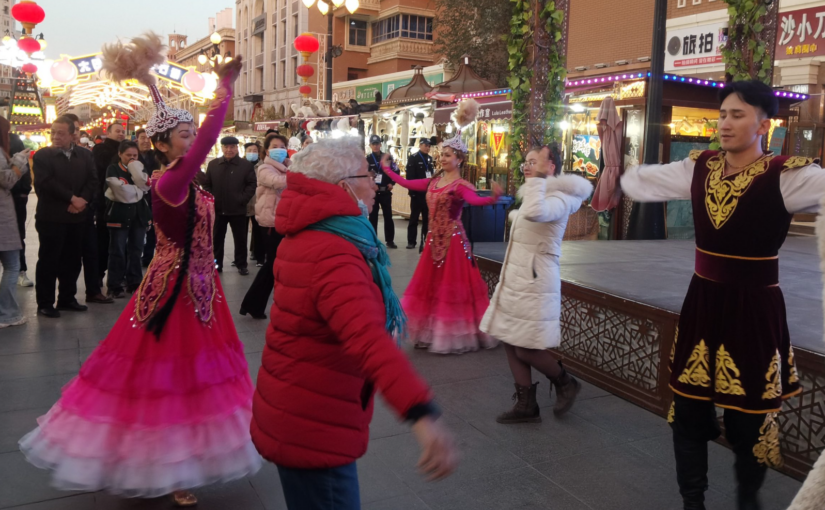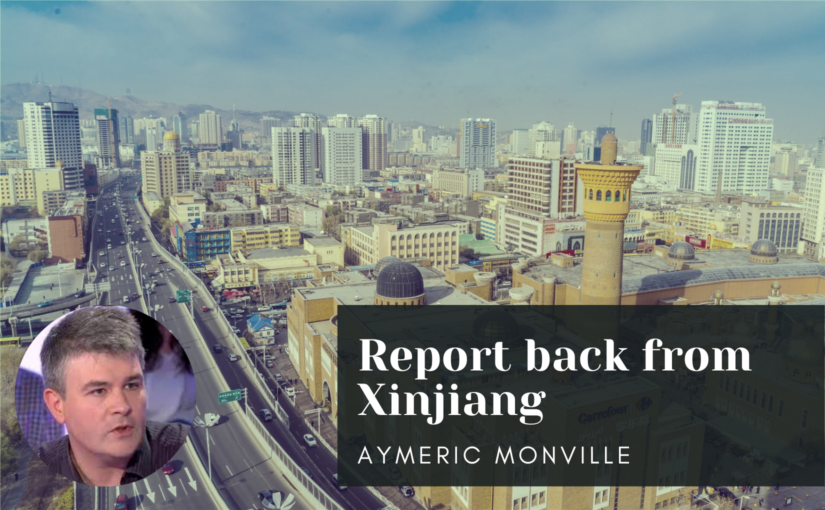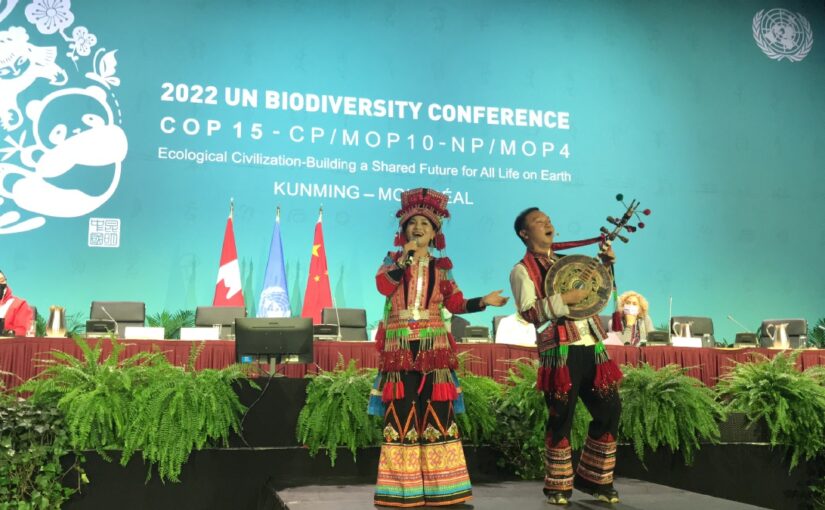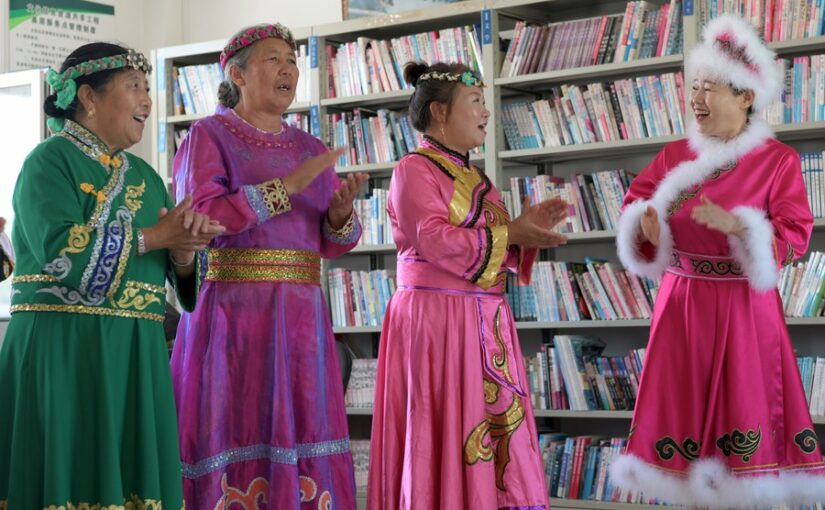We are pleased to republish below the second of Dee Knight’s reports from his recent visit to China (we posted the first instalment last week).
This article focuses specifically on the trips to Xinjiang’s two largest cities – Urumqi and Kashgar – where the group aimed to deepen their understanding of the region, particularly in light of the slanderous accusations routinely hurled by the Western media about putative human rights abuses against the Uyghur Muslim population.
Describing the group’s trip to Urumqi’s main bazaar, Dee observes that Uyghurs and Han Chinese can be seen “mixing, mingling and melding nonchalantly while shopping and doing business.” Meanwhile, contrary to the claims of cultural genocide, “street signs and advertisements typically appeared in both Chinese characters and Uyghur script.”
Dee addresses the claim that the Chinese government uses ‘concentration camps’ to indoctrinate Uyghurs and to destroy their cultural identity. He explains: “Such facilities were set up by the government to provide under-employed Uyghurs with vocational skills, recreational activities, medical services and other benefits. Most have included dormitories, where people who lived far from the center could stay during the week, and return home on weekends.” He describes meeting a 21-year-old Uyghur woman “who spoke near-perfect English” which she had learned precisely in one of these supposed ‘concentration camps’. “The training gave her the skill she needs to earn a living in the bazaar, where other members of her family also work.”
The author further discusses China’s policy in relation to minorities and religion, and notes that none of the accusations levelled at China about suppression of religious freedoms in Xinjiang are borne out by either statistics or observation. The Uyghur birth rate has been steadily rising at a far faster rate than that of Han Chinese; Uyghur life expectancy has increased from 31 years in 1949 to 72 currently; Xinjiang, like the rest of China, enjoys near-100 percent literacy; and there are a huge number of mosques in Xinjiang, which are very well maintained.
Dee concludes:
More westerners need to come and see for themselves. That may be the best way to disprove the official government and media slanders. It could also help to build people-to-people friendship. We found nothing but friendliness everywhere we visited. People were pleased when we tried to communicate in Chinese, and also pleasant and patient to communicate with us however possible. The Chinese people are definitely not our enemy, and their government is doing a very good job serving and protecting them. It really is time for the US government to try harder to make friends with China, and help forge common prosperity and a shared future.
Dee Knight is a veteran of the US peace and socialist movements, and is a member of the International Committee of the Democratic Socialists of America (DSA) and of the Friends of Socialist China advisory group.
This article was first published in LA Progressive on 19 November 2023.
As US President Joe Biden and Chinese leader Xi Jinping prepare to meet this week at the Asia-Pacific Economic Cooperation (APEC) meeting in San Francisco, the question arises whether Biden will pull back from spurious claims of “genocide” and “forced labor” against the Uyghur population in Xinjiang, China’s economically dynamic far western province.
Xinjiang, China’s far western province, has borders with Russia, Kazakhstan, Kyrgyzstan, Afghanistan, Pakistan and India. It is China’s Belt and Road portal to all these countries.
On a ten-day visit to China in early November with the theme that “China Is Not Our Enemy,” I had an opportunity to visit Xinjiang’s two major cities – Urumqi and Kashgar – hoping to see the situation up close. There have been horrific claims by US officials and the mainstream media of severe repression of Xinjiang’s Muslim Uyghur population. While these claims have recently been “walked back,” or reduced to claims of “cultural genocide” according to a YouTube report by Cyrus Janssen, our delegation wanted to see for ourselves. (The “cultural genocide” claim relates to the fact that Mandarin Chinese is a required subject in Xinjiang’s schools, while the Uyghur language is an elective.)
Xinjiang’s Surprises
No matter what you might expect from Xinjiang, it’s full of surprises – mostly very pleasant. After a five-hour flight from Beijing, Urumqi, the capital, appears like a valley oasis emerging as the rugged and craggy (and very high) Tianshan mountains loom nearby. This city of 4 million (of whom over half are Uyghurs and smaller percentages are Hui and Khazak), is a market center serving as a portal to Central Asia on the western edge of China’s famous Belt and Road. It buzzes with activity, especially near the wholesale markets where traders come to order all kinds of consumer products from everywhere, but mainly either from local artisans or from China’s manufacturing centers in the east and southeast of the country. We took advantage of wholesale prices to get a coat and hat suitable for the chilly autumn weather, and an extra piece of luggage to manage our tourist acquisitions.
China’s State Council on October 31 announced a plan to build a Xinjiang Free Trade Zone, including the regional capital of Urumqi, Kashgar prefecture and Horgos. It is the first such zone in China’s northwest border region and the 22nd pilot Free Trade Zone in China.
While shopping for beautiful silk scarves in the main bazaar, we were served by a 21-year-old Uyghur woman who spoke near-perfect English. She told us she learned it in a 10-month course in a government-sponsored training center. The training gave her the skill she needs to earn a living in the bazaar, where other members of her family also work.
Continue reading Dee Knight: Eyewitness Xinjiang



